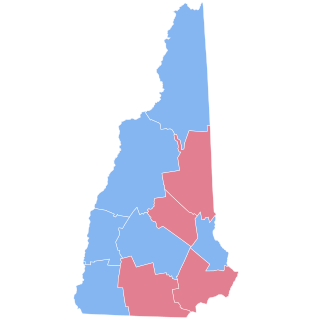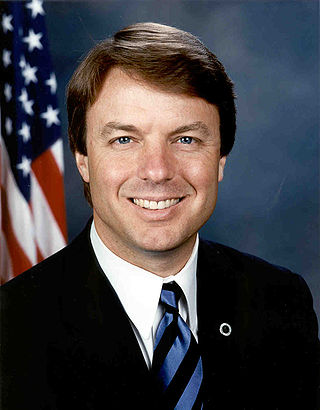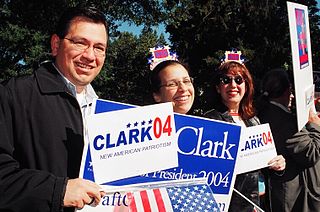Related Research Articles

From January 14 to June 8, 2004, voters of the Democratic Party chose its nominee for president in the 2004 United States presidential election.

The 2004 Iowa Democratic presidential caucuses were an election held on January 19 as part of the United States presidential primary. They were the first major test of some of the leading contenders for the Democratic Party's nomination as its candidate for the 2004 United States presidential election.

The New Hampshire presidential primary is the first in a series of nationwide party primary elections and the second party contest, the first being the Iowa caucuses, held in the United States every four years as part of the process of choosing the delegates to the Democratic and Republican national conventions which choose the party nominees for the presidential elections to be held in November. Although only a few delegates are chosen in the New Hampshire primary, its real importance comes from the massive media coverage it receives, along with the first caucus in Iowa.

Mini-Tuesday was the name given to the February 3, 2004 U.S. presidential primary where several states, which to that point had participated in "Super Tuesday," cast their votes for the Presidential nominees of the 2004 Presidential election. Mini-Tuesday was also called Super Tuesday I. With the large number of states moving their election dates up to Mini-Tuesday for the 2008 election cycle, pundits have largely shied away from using the term again, instead choosing to reappropriate the term "Super Tuesday" to better represent the primaries held on that approximate date. The date is also known as "Super Duper Tuesday," "Giga Tuesday," and "Tsunami Tuesday," among others, with the term "Mini Tuesday" falling to apparent disuse for the time being.

The 2004 presidential campaign of John Kerry, the longtime U.S. senator from Massachusetts, began when he formed an exploratory committee on December 1, 2002. On September 2, 2003, he formally announced his candidacy for the Democratic nomination. After beating John Edwards, Howard Dean, Wesley Clark, and other candidates in the primaries, he became the Democratic nominee, challenging Republican incumbent George W. Bush in the general election. Kerry selected Edwards as his running mate.
The following is a timeline of events during the 2004 U.S. presidential election:

The 2004 United States presidential election was the 55th quadrennial presidential election, held on Tuesday, November 2, 2004. The Republican ticket of incumbent President George W. Bush and his running mate incumbent Vice President Dick Cheney were elected to a second term, defeating the Democratic ticket of John Kerry, a United States senator from Massachusetts and his running mate John Edwards, a United States senator from North Carolina.

The 2004 United States presidential election in New Hampshire took place on November 2, 2004, and was part of the 2004 United States presidential election. Voters chose four representatives, or electors to the Electoral College, who voted for president and vice president.

The 2006 House of Representatives elections in New Hampshire took place on November 7, 2006 to determine who would represent the state of New Hampshire in the United States House of Representatives during the 110th Congress from January 3, 2007 until January 3, 2009.

The 2008 presidential campaign of Bill Richardson, New Mexico Governor Bill Richardson announced his candidacy on January 21, 2007, for President of the United States on ABC's This Week with George Stephanopoulos, by virtue of forming a presidential exploratory committee.

The 2004 New Hampshire Democratic presidential primary was held on January 27, 2004. Taking place eight days after the Iowa caucuses, it marked the second contest to take place during the Democratic party's 2004 primary season, as well as the first actual primary to take place.

The 2004 Arizona Democratic presidential primary took place on February 3, 2004, as part of the 2004 United States Democratic presidential primaries. The delegate allocation is Proportional. the candidates are awarded delegates in proportion to the percentage of votes received and is open to registered Democrats only. A total of 55 delegates are awarded proportionally. A 15 percent threshold is required to receive delegates. Frontrunner John Kerry won the primary with former general Wesley Clark coming second.

The 2004 presidential campaign of John Edwards, U.S. Senator from North Carolina, began on September 16, 2003.

The 2004 presidential campaign of Howard Dean, 79th Governor of Vermont, began when he formed an exploratory committee to evaluate a presidential election campaign on May 31, 2002. Dean then formally announced his intention to compete in the 2004 Democratic primaries to seek the Democratic Party's nomination for President on June 23, 2003. Dean dropped out of the race in February 2004 after a poor showing in the Wisconsin primary.

The District of Columbia held a primary on January 13, 2004 and caucuses on February 14, 2004 during the 2004 Democratic presidential primary season. Delegates were only allocated in the February 14 caucuses.

The 2004 California Democratic presidential primary was held on March 2, 2004, the same day as the Republican primary. Senator John Kerry overwhelmingly won the primary over rivals Senator John Edwards, Congressman Dennis Kucinich, and Reverend Al Sharpton. The primary was open to both registered Democrats and unaffiliated voters. 440 delegates were at stake, with 370 tied to the March primary.

Electoral history of John Edwards, United States Senator from North Carolina (1999-2005), 2004 Democratic Vice Presidential nominee and candidate for Democratic Presidential nomination in 2004 and 2008

The 2004 presidential campaign of Wesley Clark, a retired U.S. Army general who served as Supreme Allied Commander Europe (SACE) from 1997 to 2000, officially began on September 17, 2003. A movement to draft Clark for the Democratic nomination began in April 2003, and was led by activists who felt Clark's military service and criticism of the War in Iraq made him a strong candidate. Prior to announcing his campaign, Clark was not known to have publicly identified with either party.

The 2008 United States presidential election in New Hampshire took place on November 4, 2008, as part of the 2008 United States presidential election throughout all 50 states and D.C. Voters chose four representatives, or electors to the Electoral College, who voted for president and vice president.
Debates and forums took place between candidates in the campaign for the Democratic Party's nomination for the president of the United States in the 2004 presidential election. The Democratic National Committee sanctioned 6 debates out of 16 total.